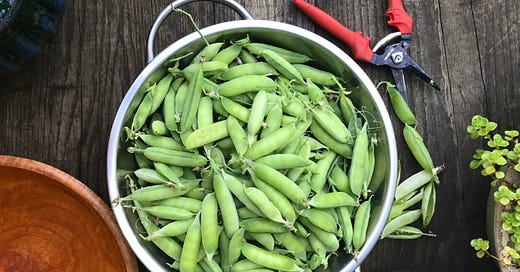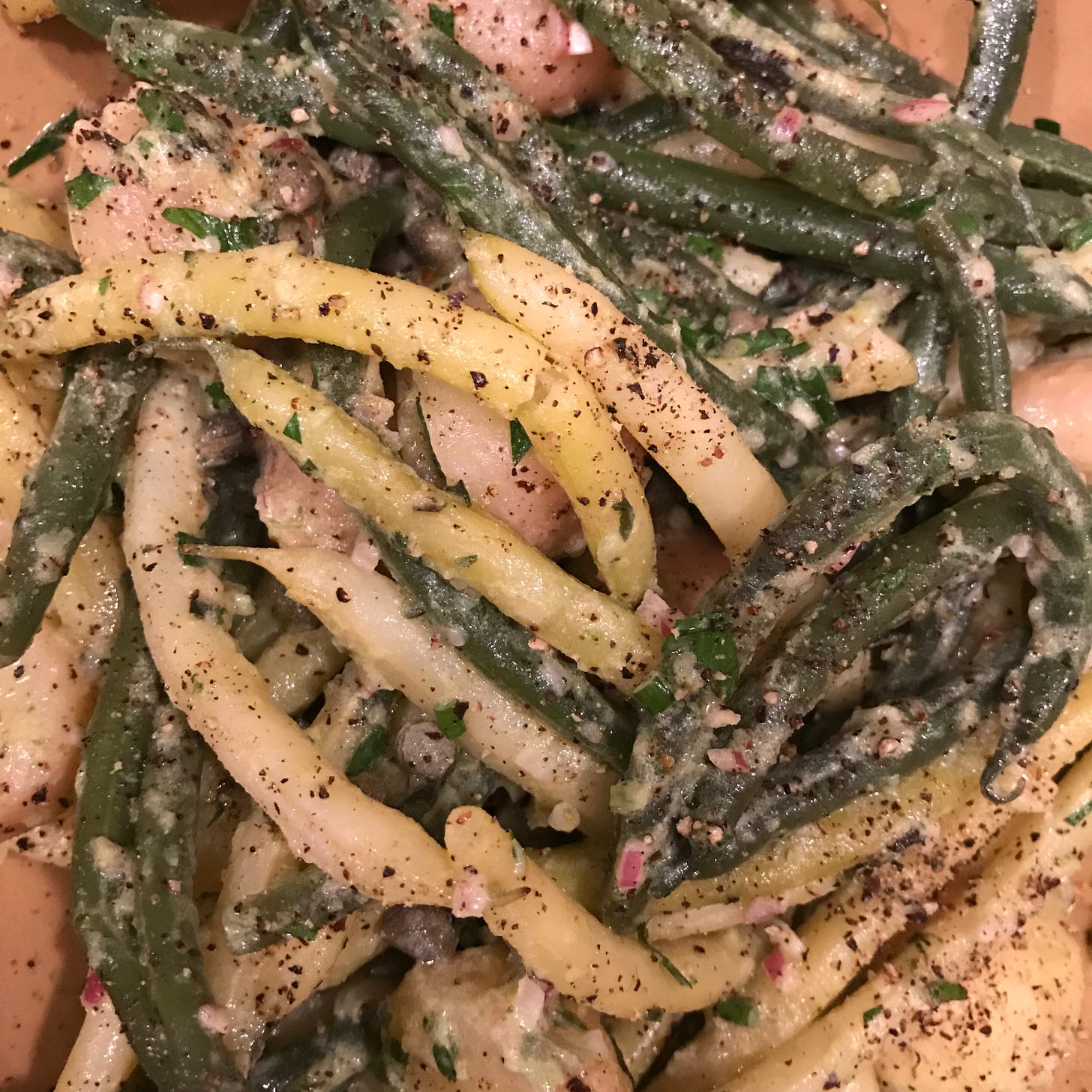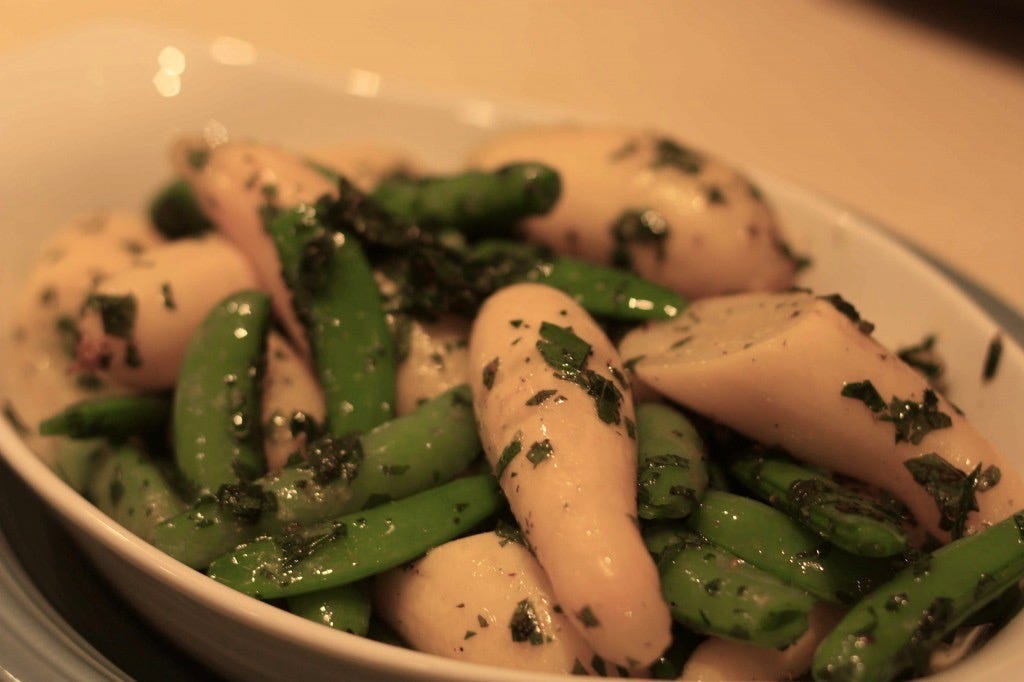My people are not gardening folk.
My father used to joke that my great grandparents were so bad at farming their tiny plot in Ukraine that back on that fateful day in 1942, even the Nazis didn’t want it. (If only.)
I did find out a few years ago that my mother helped plant her uncle's victory garden in Brooklyn when she was a very young girl; she told me that she dug and dug and planted and planted, and when I asked her what it was she grew, she couldn't tell me.
No idea, she said, shrugging.
Did you eat any of it? I asked.
No idea, she said, shrugging.
Which makes sense because to this day, not a single vegetable passes my mother's lips on even a bi-annual basis. It's not like Susan's late mother, who grew up on a small subsistence farm and ate absolutely everything that her mother grew absolutely all the time, and who was able to give me five recipes for What to Do With Rutabagas off the top of her head, even at 94. So why did my mother grow something if she didn't actually eat it? She was from Brooklyn. She was a city girl. For her, it was the childlike act of planting and getting dirty; and it was the joyous thrill of seeing something she had stuck in the ground turn into something edible. Even if she didn't eat it.
I remember those days myself, when Susan and I were first together. We built gigantic garden boxes in her sun-drenched backyard; I'd sit in the dirt out there, in a moronic, city girl outfit I’d cobbled together for myself --- Banana Republic overall shorts and red rubber clogs and full makeup --- digging around, pulling weeds, staking up tomato plants. The first summer of 2000 —- twenty-two years ago —- after my dot com went belly up and we were living together almost full time, we planted everything we could think of: summer squash, winter squash, cucumbers, radishes, kale, four different kinds of lettuce, wax beans, sugar snap peas, two different kinds of gorgeous, ruby red beets. (Even though I loathe beets.) We were also both unemployed, which is good incentive for planting a garden.
I was like Ripley in Alien, only with a rake, even though I couldn't actually stomach the things that were eaten.
One morning, we went down to the garden to discover that something or someone --- birds, chipmunks, deer, woodchucks --- had eaten all of our beets, and our beet greens. Little chewed-on spindly nubs stood in the boxes where the lush vegetables had once lived and grown nearly to full vegetablehood. I flew into a rage. How could this happen? I was like Ripley in Alien, only with a rake, even though I couldn't actually stomach the things that were eaten.
Sometimes, Susan said, stuff just dies. It gets gorgeous, it looks perfect, everything is fine and great, and then other things decide that it's just as gorgeous as you think it is, and they get there first, usually the morning you're planning on going out with your little basket. It is what it is.
And then she went back to weeding.
When she said that, I understood why my people had never been fond of gardening: it was a huge amount of work under a constant, relentless threat of disappointment, of losing something you worked so hard to create, of trotting down the stairs in the morning, tra la, and seeing it ravaged. And there not being a damned thing you could do about it.
The following year, when Susan and I were living together full time, I had become a dedicated organic vegetable gardener. I'd tossed the idiot overalls and the clogs and the fancy leather gloves and instead worked in an old pair of khakis that I picked up at Goodwill, and rubberized gloves that Susan's mother had found somewhere for $2. I had even become adept at composting, the definition of which is taking dreck and turning it into more dreck. Because vegetables, I discovered that summer, love dreck. Waste not, want not.
Look at you, Miss Gardener, my father said when he and my stepmother came up to visit on my birthday, arriving while I was in the front yard, deadheading the roses in a straw hat. I looked like Lillian Gish in The Whales of August. He gave me a check for my birthday, which I promptly spent on a rototiller.
What's next for you---a John Deere?"he asked, laughing. It was; a few months later, I was driving around the backyard on a green and yellow lawn tractor instead of pushing the mower around haphazardly, and carving out crop circles that probably could have been seen from outer space.
The night that my father and stepmother visited, our dinner was simple: we pulled masses of tiny yellow summer squash and snap peas from their vines, and ate them gently boiled for a few seconds, Pugliese-style, showered with rich green olive oil, and handfuls of fresh herbs and sea salt. We made a pot of bouillabaisse and opened a cold bottle of Domaine Tempier Bandol Rose, and it was one of the best birthday dinners I'd ever had, before or since. Much has changed since then.
One Saturday morning a month or so later, on August 3rd, Susan and I were out in the garden, up to our knees in dirt; it was a hot, sweaty morning --- the kind where everything sticks to you, and you look down at your filthy, disgusting legs and they look like the filthy, disgusting legs of you as a child after a day of running around outside --- and we were both soaked to the skin in damp, compost-covered tee shirts and shorts. We went into the house to get a glass of water when the phone rang.
Please come now, my stepbrother said, frantically. There's been an accident.
I don't remember hanging the phone up; maybe I didn't. We left the tools in the garden and grabbed the car keys, and not bothering to change, raced to New York, where my father and stepmother had been in a car accident which, for him, was fatal: he died a week later. When we got to the hospital that day and I sat with him for an eternity in the emergency room, I looked down at my hands, my nails, my legs, my feet, my shirt, caked with mud and the lifeblood of the food we'd shared with him a few weeks before.
I was a gardener, at last, and though I knew that he found the idea ironic, it heartened me to know that the last time I'd seen him, he'd enjoyed the fruits of my labor.
Boiled Baby Summer Squash and Snap Peas
It sounds ridiculous, the idea of boiling vegetables when you stopped going down that road years ago, after leaving your mother's home. Because, if you grew up in the 60s and 70s the way I did, odds are you ate vegetables that were boiled beyond all recognition; the Brussels sprouts that rolled around on your plate were likely gray.
But the act of boiling very fresh vegetables quickly and carefully works beautifully for two reasons. On the one hand, giving them a warm bath seems to cook them perfectly, and then when you plunge them into ice water to shock them, they seize up, hang onto their gorgeous flavor, and retain their crispness. On the other hand, water boils at 212 degrees, while steam --- and many of us favor steaming for purely psychological reasons; we think it's a gentler method, which, in fact, it is not --- can reach temperatures far higher than that, which results, if you steam your vegetables, in mushy, slimy, flaccid floppiness. This recipe, which was inspired by what was growing in our garden at the time I made it, couldn’t be more simple or delicious. Feel free to increase the amount of vegetables as desired; just increase the amount of herbs and oil proportionally.
Serves 3-4 small portions
5-6 small, young yellow summer squash
1/2 pound sugar snap peas, tipped and tailed
3/4 cup of chopped or lightly pounded herbs (I prefer parsley and thyme here)
excellent quality extra virgin olive oil
sea salt, to taste
Place a large bowl filled with ice cubes in your sink; fill it with water, and set it close to your stove.
Bring a large pot of water to a rolling boil over high heat. Add the summer squash and cook for five minutes. Add the sugar snap peas and continue to cook for another two minutes. Using a spider or a long-handled sieve, lift out the vegetables and plunge them into the ice water for a minute.
Remove the vegetables to a serving platter and shower them with the herbs, tossing well to distribute them. Drizzle with as much or as little good olive oil as you like (I vote for more rather than less), sprinkle with salt, and serve at room temperature.
Other options:
• Using a vegetable peeler, shave long, wide strips of Parmigiana Reggiano, or better yet, an older sheep's milk cheese, over the plate
• Toss the vegetables with pitted, black, oil-cured olives
• Toss leftovers with excellent quality Ventresca tuna and a handful of soaked and drained capers
• Coarsely chop leftovers and toss them with hot spaghetti, fresh lemon juice, and feta, and serve at room temperature
• Sweat the leftovers in a large cast iron pan, toss with a few beaten eggs and a grating of Parmigiana Reggiano, and bake at 350 degrees F until golden. Serve in wedges.








I definitely am salivating for a roto-tiller. Interesting about plunging the vegetables into cold water.
I got super hungry reading this because you have such a wonderful way with words and telling a story that hits me on different levels. Level one: gotta try that recipe and the cold water dunking
Level two: nourishment, your wonderful father, dirty knees, muddy legs like when a child = vivid.
Level three: a godliness or rather something holy about the way you write about cooking and food.
Seriously.
Hi Elissa, sorry to post here again but after finally navigating the substack app I’ve realised there IS extra content for paid subscribers. I have transferred my AOL subscriber email to my Gmail so I’m hoping I will get your paid subscriber content straight to my inbox now, rather than having to look in the Substack app and sign in each time with a subscriber link, would this be possible? As I say, I love your writing and I want to offer support so I’m happy to continue subscribing rather than get a refund for now. Wishing you all the best, Karen